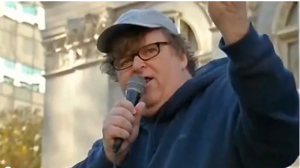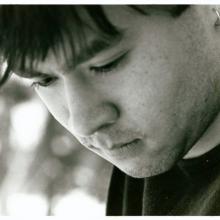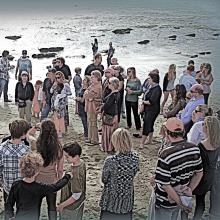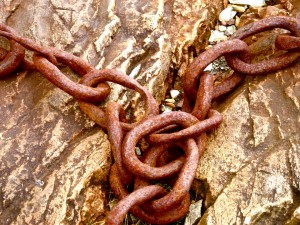Hope
My neighbors signed my report card.
Having had the same conversation countless times in my life, I have learned that one sentence sums up a cacophony of explanations.
It is tricky, I have found, trying to explain why friends are listed as my emergency contacts, why I wake up Christmas morning in the home of people to whom I am not related, and why my parents — both living — have been anything but.
The separation started so long ago that I struggle to remember exactly when it began. When I was starting middle school my mom’s depression hit hard and fast. My dad, who understands love as a finite commodity, could not muster any for me. Loving her meant giving all of it to try to save her. His attempts and inability to do so created a stress that amplified his MS from inconvenient to disabling.
In a moment, it seemed, they were gone.
We were wealthy and Southern and had everything that went along with both: a close-knit community, punctilious social obligations, and money to stay afloat. In the world in which I grew up, everyone surely knew everything about everyone, but damn if they weren’t polite enough to pretend it was all OK. It was a magnificent masquerade.
But the truth remained: I was an orphan.
A few weeks after the October 2002 plane crash that killed Sen. Paul Wellstone, his wife, Sheila, their daughter, Marcia, and five others, a Lutheran confirmation class visiting D.C. from Minnesota decided to stop by Wellstone’s office to pay their respects. As the group went through security at the Senate office building, one of the students—who had worked on the senator’s re-election campaign and was still wearing a Wellstone button—set off the metal detector. The officer took her to the side to wand her. As he was checking her, the guard said, “Not one other senator in this place knows my name; Paul Wellstone knew my kid’s name.” He and the student hugged each other, and both started weeping.
Paul Wellstone touched people’s lives in profound ways, mostly because he genuinely sought to live a life of integrity, in both public and personal matters. He once advised, “Never separate the life you live from the words you speak,” and those who knew him best said he honestly tried to follow that advice. (A Midwest political observer said the Right never knew what to do with Wellstone, because he lived “conservative values” at home while working for progressive change in the public sphere.)
Wellstone’s political career began when, as a political science professor at Minnesota’s Carleton College, he started working with farmers to block electric lines forcibly run through their farms—and he continued to organize and agitate on behalf of regular people for the rest of his days.
Bob Hulteen, a longtime Minneapolis-based activist (and a former Sojourners editor), said that Wellstone respected people more deeply than “any politician, or church leader, I’ve ever met—and, maybe most important, he didn’t take himself too seriously.” But Wellstone never underestimated the seriousness of his work for a better world, which is why, a decade after his passing, we asked several people who have been touched by his life in various ways to offer their thoughts on the legacy of a man who continues to offer a model of inspiration, integrity, and hope—attributes that are profoundly needed, in this and any election season.
—The Editors
WHEN A GROUP of refugees from Burma who attend my church in Melbourne, Australia, asked me to co-lead a study of the book of Revelation last year, at first I was apprehensive. After all, the book is strange and confusing. Many, including Martin Luther, have asked whether it’s even necessary to include it in the New Testament. But, as our group plunged into Revelation’s mysterious depths, I was to learn that, unlike Western Christians, praying refugees readily see its lessons about the powers of evil—social, political, spiritual, and personal—and the decisive struggle that the Son of God mounts against them.
The 18 young women and men in the study, who ranged from 16-to- 24-years old, were members of the Karen ethnic group. The civil war in their home region of Burma has, over decades, resulted in massive displacement and suffering. In recent years thousands of Karen people have resettled in the U.S. and other countries, including Australia. (Although current political developments in Burma raise cautious hope of eventual peace, at present fighting continues in Karen State and other areas inhabited by ethnic minorities.)
Leading the study of Revelation with me was Thara Nonoe, a Karen man in his mid-50s highly esteemed in the community for his skills in imparting knowledge and writing poetry. (“Thara,” which means “teacher,” is a Karen title of respect.) The young always listen to him keenly. Our six-part study was a segment of a two-year series of lay religious education. As I prepared, I was haunted by Peter’s sermon on the day of Pentecost: “In the last days, God declares, I will pour out my Spirit” (Acts 2:17). Pentecost signifies that the last days have arrived, in fulfillment of the words of the prophet Joel. In my mind, these words have particular reference to oppressed believers such as Christian refugees.
I have been a Little League baseball coach for both of my sons’ teams for many years. And I’ve learned that baseball can teach us life lessons.
Just a few weeks ago, my 9-year-old’s team was down 5-0, and we had already lost our first two games. It didn’t look good. But all of a sudden, our bats came alive; all our practice and preparation suddenly showed itself. Best of all, our rally started in the bottom half of the order, with our weakest hitters. Two kids got on with walks, and our least experienced player came to the plate. With international parents, he had never played baseball before, and you could tell he didn’t have a clue. But somehow he hit the ball, and it went into the outfield. Our first two runs scored, and he ended up on second base. Being from a British Commonwealth culture, he began to walk over to the shortstop and second baseman and shake their hands! “Stefan,” I shouted. “You have to stay on the base!” “Oh,” he said. “I’ve never been here before.”
Inspired, other kids who had never got hits before also got them now. Then the best hitters started to hit, and we came back to win 11 to 6. In a long team meeting afterward, the kids couldn’t stop telling each other what they had learned. “We didn’t give up, and we came back!” “Our rally started with the bottom of the order.” “Sometimes you get what you need from unexpected places.” “We all just kept cheering for each other.” “Everybody helped us win today.” Finally, our star player said, “This just goes to show you: You can’t ever give up on hope. We always have to keep on hoping no matter what.”
This is central to our vocation in the churches: to offer unexpected hope, because our mission is to the kingdom of God—“thy kingdom come, thy will be done, on earth as it is in heaven.” That is what we pray. And while the kingdom of God was the central message of Jesus and the New Testament, it has faded as ours. Finding salvation to heaven is part of the message, getting closer to God is part of the message, but the heart of the message of Jesus was a new order breaking into history—changing everything about the world, including us.
Where there is no vision, the people perish. ~ Proverbs 29:18
Thursday’s Supreme Court ruling on the constitutionality of the Affordable Care Act was remarkable in a number of ways. The vast majority of articles, blogs, and analyses focus on the political ramifications of the decision.
Is this a win for the Obama administration or fuel for the Romney campaign? Pundits have looked at nearly every political angle, from the upcoming presidential election to its effects on local politics.
While I appreciate the political analysis and the importance of political processes to the wellbeing of the United States, I believe that a majority of coverage has missed one of the most remarkable points of the ACA: It changes the vision of our national community.
In the latest edition of The Economist, a new theory on how to tackle poverty: offer hope.
The idea that an infusion of hope can make a big difference to the lives of wretchedly poor people sounds like something dreamed up by a well-meaning activist or a tub-thumping politician. Yet this was the central thrust of a lecture at Harvard University on May 3rd by Esther Duflo, an economist at the Massachusetts Institute of Technology known for her data-driven analysis of poverty. Ms Duflo argued that the effects of some anti-poverty programmes go beyond the direct impact of the resources they provide. These programmes also make it possible for the very poor to hope for more than mere survival.
Read more about Ms. Duflo's research here
Experiments in my first science class at school left an indelible impression on my imagination. I was particularly fascinated when the physics teacher covered a hefty bar magnet with a sheet of paper and then sprinkled iron filings over it. We made the filings jump about by banging the table and when they fell back they aligned themselves into a graceful fern-like pattern, revealing the invisible lines of force emanating from the magnet below. That’s why I love this sentence from the Easter sermon in John Updike’s novel A Month of Sundays: “Still to this day ... the rumor lives, that something mitigating has occurred, as if just yesterday, to align, like a magnet passing underneath a paper heaped with filings, the shards of our confusion, our covetousness, our trespasses on the confusions of others, our sleepless terror and walking corruption.”
Again in Eastertide we sense that the resurrection of Jesus has started to pull the scattered impulses of our lives into a new pattern. We realize afresh that Christian life is essentially powered by hope, a passion for the unprecedented, possibilities for life in our world that have never been seen before. We recall that Christian life is not a religious ideology to be propagated, but an actual incorporation into the person of the risen Christ and an intimate experience of divine indwelling, through the Spirit active and present in the heart and in our relationships.

Sunrise over New York City. Image via Wiki Commons (http://bit.ly/HRlswn).
I know that the sun will rise tomorrow.
With all of the scientific facts and astronomical data we are blessed with today, I can expect to wake up tomorrow and see rays of light shining through my window.
There is also no debating time. Our clocks, both digital and internal, continue to tick onward no matter the circumstances. These are inexorable certainties in life. However, these proven facts of our existence are limited. They are not the whole story.
There are things in life we neither can physically see nor explain, and yet we choose to believe anyway.
When our little siblings place their fallen teeth underneath their pillows, hoping to see a winged fairy deliver gifts in return, they are relying entirely on an unproven belief. When students choose universities to attend, they do not know what the outcomes of their decisions will be, nor can they predetermine their futures after school. But they continue to grow and experiment with life anyway.
Even the wisest of theologians and clergy have very few answers to the questions pertaining to God’s existence that enter our minds on a daily basis. All of these situations represent something many of us hold onto so dearly: Faith.
A friend of mine — one who’s wiser and kinder and more thoughtful than I — knows the difficult, painful unweaving I’m talking about. She, too, was carroted down the rabbit trail of a hope-filled future shared with someone, only to discover her bed was left just as cold as the promises she’d so earnestly trusted.
“Falling in love is totally magical and beautiful and gives you this insane ability to operate on 4 hours of sleep a night for a long time,” she said. “It chooses you and that gift is one of life’s best ones. You have to choose it back, though.” She paused, her voice cracking, and I knew she meant it. “At some point, you become more real to each other and the hard work sets in. So you try and try, and even then, sometimes it doesn’t work out. And when that happens, you’ll be ok.” I was looking at her across the table.
“Just let it be sad,” she concluded. “Ironically, sadness will be your guide out of sadness.”
Hugo, Take Shelter, and The Mill and the Cross have little in common on the surface other than their quality; look deeper and you may find love-filled, theologically profound, hopeful invitations to live better.

Port-au-Prince church post-earthquake. Photo by Colin Crowley via Wylio http://www.wylio.com/credits/Flickr/4293703467
How does one dig out from under such tragedy? How does one have hope for a better life, for a new Haiti?
In a meditation titled "The Gates of Hope," Minister Victoria Safford writes:
"Our mission is to plant ourselves at the gates of hope -- not the prudent gates of Optimism, which are somewhat narrower; nor the stalwart, boring gates of Common Sense; nor the strident gates of self-righteousness ... nor the cheerful, flimsy garden gate of 'Everything is gonna be all right,' but a very different, sometimes very lonely place, the place of truth-telling, about your own soul first of all and its condition, the place of resistance and defiance, the piece of ground from which you see the world both as it is and as it could be, as it might be, as it will be; the place from which you glimpse not only struggle, but joy in the struggle — and we stand there, beckoning and calling, telling people what we are seeing, asking people what they see."
Indeed, we need to plant ourselves at the gates of hope and work toward a just peace, on Earth as it is in heaven.

"Holy Family's flight to Ethiopia." Image via http://bit.ly/w3Z2K9
In the Incarnation, Christ brings hope to a world where, for the time being, Herod is still king, and all is not as it should be. Christmas includes the story of a terrible genocide — a traumatic refugee experience for young Jesus and his parents, and all the worse for those parents who were not warned in a dream and thus did not escape to Egypt before their infant sons were murdered — but as evangelicals we seldom reflect on this part of the story. (Catholic & Anglican Christians remember these victims on the Feast of the Holy Innocents on December 28, a practice I adopted for the first time last year.)
The great hope of Christmas, though, is that it represents the entry into history of a Prince of Peace, who will eventually dethrone Herod and Caesar and set all things right. We’re still living in that tension: Christ’s kingdom has been inaugurated but is not here in fullness yet, as the injustice of last December’s DREAM Act vote and a thousand other tragedies of poverty, conflict, and marginalization throughout our globe remind us. So Christmas is a time for mourning and for hopeful joy: and it is entirely right that Advent is a time of eager and expectant yearning. O Come, O Come, Emmanuel!
Last night we watched the First Family light the National Christmas Tree.
We expected what we get every year: a broad message about generosity and the season of giving. But what we got was so much more.
President Obama’s remarks were encouraging. They were about the Christmas that Christians celebrate as a week of Advent, not just Christmas as a generic feeling or a season. Several news outlets, including CBN, CNN, and The Christian Post covered the story in a tone of support, somewhat surprised at the president speaking from a place of deep personal faith. His remarks were so wholly about the Christ in Christmas that it could have been delivered by a local reverend.

By Reuvenk via Wikimedia Commons (www.gnu.org/copyleft/fdl.html)
The news is hopeful. We have seen both progress and proof:
- New data shows that an HIV-positive person on treatment is 96 percent less likely to pass HIV on to others.
- It only costs, on average, $335 for AIDS treatment through PEPFAR (down nearly 70 percent since 2004!).
- 22 countries in sub-Saharan Africa have reduced new HIV infections by 25 percent.
- Clinical trials show that voluntary male circumcision reduces the risk of new HIV infection in men by roughly 60 percent.
Yesterday was truly a momentous occasion. Looking at all the progress we have made, especially in the last 10 years, it is a moment for us to not only celebrate, but in the words of President Jakaya Kikwete of Tanzania, “recommit ourselves,” to end the fight against AIDS totally.
To me, "unexpected" is at the heart of how I understand grace. It is the unearnable gift, the divine reversal and sacred surprise, the still small voice that drowns out the din of the maddening crowd, the little bit extra that my Cajun friends call lagniappe, the very thing we "deserve" the least but get anyway. From God. From the One who created the world and the audacious, indescribably power of love.
Taking a cue from Nell, here are just a few of the unexpected blessings I am grateful for today:
For God's fingerprints that cover every inch of our world, seen and unseen. And for the moments where I can almost make out the holy whirls imprinted in the sky, the ocean, the sunlight, and on the faces and stories of each of us.
For the generosity and selflessness I see so vividly — all around me, all the time — even in these lean, nervous days. I saw it in Zuccotti Park, where strangers prepared and served food to other strangers. I saw it in the sober faces and strong arms of the men who helped 84-year-old Dorli Rainey to safety after she was pepper-sprayed at an Occupy rally in Seattle. I heard it in the prayers lifted at the White House, at North Park University in Chicago, and in the basement of a church in Spanish Harlem where kind, mighty souls formed Human Circles of Protection last week and stood in solidarity with the poor, the vulnerable, and the least of those among us. I watched it on display at border crossings, immigration rallies, refugee camps in the Horn of Africa, and at a glass blower's studio in my hometown of Laguna Beach where strangers arrived with shovels and wheelbarrows to help dig out an artist and his artwork from the muddy ravages of a flash flood. I saw it in the fresh coat of paint on the front steps of my elderly parents' home in Connecticut that my cousins had applied for them with great care and kindness when my brother and I couldn't be there to do it.
Billy Graham has always been a life-long learner, passionate about preaching the gospel but always ready to understand more about what that gospel means in the world. It was never surprising to me that this southern born and raised American evangelist decided early on to insist on preaching only to racially integrated coliseums and crusades, when many others just went along with their culture. Later, as a result of falling in love with the new congregations we was preaching too in Eastern Europe and the Soviet Union, had a "change of heart" on the nuclear arms race-which we featured in a cover interview with the evangelist in Sojourners magazine. Billy Graham has also been willing to admit his mistakes and grew from them, which is something all of us as "leaders" need to constantly learn from. And while a conservative evangelical all his life, Graham was never drawn to the hard edged and politicized fundamentalism of the "Religious Right" but instead often winced at them.
I always notice something when speaking to a mostly secular audience. Many people have been so hurt or rejected by the bad religion in which they were raised or have encountered elsewhere over the course of their lives, and, quite understandably, they are skeptical and wary of the faith community. But when someone looks like a faith leader (this is where the ecclesial robe helps ) and says things that are different from what they expect or are used to, their response is one of gratitude and the moment becomes an opportunity for healing.
After I spoke Sunday and joined the circle around the White House, person after person came up to me to express their thanks or simply to talk.
My favorite comment of the day came from a woman who quietly whispered in my ear, "You make me almost want to be a Christian."

Filmmaker Michael Moore told anti-Wall Street protesters in Oakland that the Occupy movement -- which has spread to cities across America and overseas -- in inspiring millions who are angry about corporate excess, income inequality and the failure of politicians to address issues facing the majority of Americans.
"We've killed despair across the country and we've killed apathy," he said.
Watch the video of Moore's speech inside...







